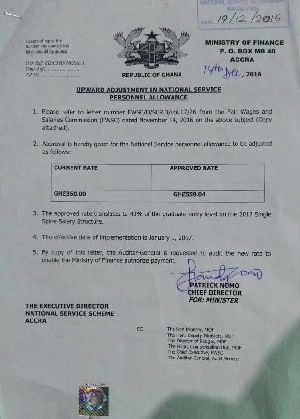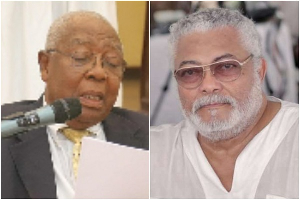Graduates from the various accredited tertiary institutions are required to render a one year mandatory national service to the nation under the Ghana National Service Secretariat Act, Act 426. However, graduates who are forty years and above as well as individuals who have rendered National Service at an earlier date are exempted.
As a form of remuneration, the personnel are paid monthly allowances throughout the service year as determined by the Ministry of Finance. Nevertheless, these personnel over the years have expressed dissatisfaction with the amount paid them in the face of high cost of living in all parts of the country.
The costs of rent, utility, transportation and other expenditures are not anything the meager 350.00 cedis paid the personnel in recent years could arrest. This has led to untold economic hardship for these personnel throughout the service year since the allowance is their major source of income.
The National Service Personnel Association has on several occasions prayed government to increase the allowance to help them meet the cost of living, and on the 16th December last year, government accepted the prayer to increase the allowance by sixty percent. This means that National Service Personnel would now receive a monthly allowance of 559.04 effective January 2017.
 The announcement for the increment has been the ‘news of the century’ for the personnel and had received a wide satisfaction and jubilations from the personnel and the entire tertiary student body. At least, a long time prayer is answered and relief has come.
However, the national service personnel have had the greatest shock ever when they went to the bank for their allowances. It was only then they were told they are still taking 350.00 cedis instead of the 559.04 cedis approved by the erstwhile government.
 As a result, leadership of the National Service Personnel Association took the press to express disappointment in the current administration and also threatened to demonstrate against it if government fails to pay what is ‘due’ them within one week ultimatum.
I am a final year student who would also be rendering this mandatory service very soon and so, I admit that the Service Personnel have a legitimate concern to express the above sentiment and would also be the first person to support any demonstration in this regard.Â
This notwithstanding, I deem it prudent and only appropriate to call on our national service personnel to understand the situation at the moment and allow government the time to put in place the necessary measures to implement this decision taken by an erstwhile administration.
It has become obvious that the erstwhile government took the decision to increase the allowances without providing the necessary room for its implementation. For the avoidance of doubt and for the purpose of setting the records straight, it is imperative to state that the budget the current government is working with was drawn by the previous government and approved by the sixth Parliament for the first quarter of 2017.Â
This means the current administration has to operate strictly by this budget, which further suggests that any expenditure not budgeted for by it cannot be carried out by the current Nana led administration.
In short, the erstwhile Mahama government took the decision to increase the allowance effective January 2017 but the increment was not captured by the budget his government drawn for the first quarter of 2017. The effect is that the new allowance cannot be paid within this period.
It could be argued that government can pay the new allowance if it is committed and willing to do so. The basis of this argument is that the government only needs to present a supplementary budget to Parliament to that effect which sounds logical on the face value.
However, it is important to note that the President is now putting together his government and the person who has the mandate to present this supplementary budget to Parliament is the Finance Minister who has just been vetted and approved by Parliament.
The way forward is to request the President to make provisions for the implementation of the increment in the maiden budget his government would be presenting to Parliament in March. This would be alongside the measures for restoration of the Nursing and Teacher trainee allowances as indicated by the government.
The Senior Minister, then Senior Minister designate, Yaw Osafo Marfo indicated that the Nursing and Teacher trainee allowance is only 0.01% of G.D.P while our debt servicing, thus the interest payment on borrowing  alone is about 7% of G.D.P and so, if government is able to reduce the debt servicing by even 1%, the allowance can easily be paid without any headache for government. He made this revelation when he appeared before the Appointments Committee of Parliament. If his analysis is anything to go by, then the new National Service allowance can also be paid without headache for government.
In summary, the current government cannot be faulted for the time being for not paying the increment since the previous government took the decision without providing the room for its implementation. The government can only be requested to make provision in its maiden budget to relief the National Service Personnel of their high cost of living. Failure to do this would grant the personnel the moral right to demonstrate against it.
Ayornu Ibrahim
ibrahimayornu@gmail.com
Opinions of Wednesday, 8 February 2017
Columnist: Ibrahim, Ayornu















